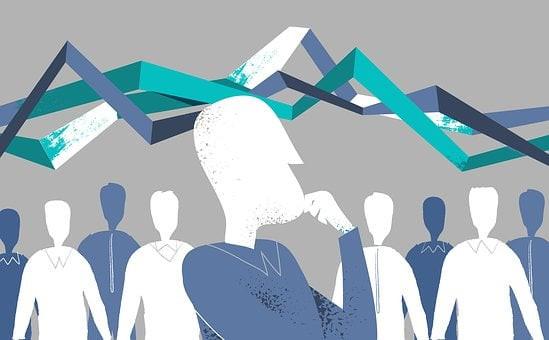How People Think
Curated from: collaborativefund.com
Ideas, facts & insights covering these topics:
18 ideas
·72.2K reads
204
10
Explore the World's Best Ideas
Join today and uncover 100+ curated journeys from 50+ topics. Unlock access to our mobile app with extensive features.
People are so different, yet have the same reactions and insecurities
There are nearly eight billion people alive today. Everyone has a story. Each has seen something different and thought something unique and extraordinary you can't understand. Similarly, you have experienced stuff they wouldn't believe.
While technologies evolve and circumstances change, many behaviours across generations and geographies are universal.
880
9.62K reads
Everyone belongs to a tribe and underestimates how influential that tribe is on their thinking
Tribes are everywhere - countries, states, parties, companies, industries, departments, investment styles, economic philosophies, religions, families, schools, majors.
Everyone loves their tribe because there's comfort in knowing that people understand your background and share your goals. But tribes have their own rules, beliefs, and ideas that you disagree with. Yet you support it or become blinded by loyalty because you don't want to risk being shunned by the tribe.
893
6.85K reads
What people present to the world is a tiny fraction of what’s going on inside their head
So much of history has been recorded in the world, yet the most prolific over-sharers disclose maybe a thousandth of a percent of what they've been through and what they're thinking.
Most people only share what they want you to see. This gives a false view of success.
Most things are harder than they look and less fun than they seem. We're exposed only to the highlight of what people want you to know to increase their own chances of success.
909
5.7K reads
Prediction is about probability and putting the odds of success in your favor.
... But observers mostly judge you in binary terms, right or wrong.
The idea that something can be likely and not happen, or unlikely and still happen, is one of the world's realities. The best you can do is make decisions where the odds are in your favour. Yet, most of what people care about is, "Were you right or wrong?".
People crave certainty. They're not interested in a 60% chance of a recession happening. If someone says "There is going to be a recession this year," they offer something to grab on that feels like you can be in control of your future.
874
4.82K reads
Nothing too good or too bad lasts indefinitely
When you're in the middle of a powerful trend, it's difficult to think how it can turn the other way.
We often don't see that what turns trends around usually isn't an outside force. It's when a subtle side-effect of that trend starts to erode. For example, when there's a crisis, people get motivated. When they get motivated, they solve problems. When they solve problems, crises tend to end.
884
4.28K reads
Optimism and pessimism always overshoot
Jerry Seinfeld had the most popular show on TV. Then he quit. He later stated that the only way to identify the top is to experience the decline, which he wanted to avoid.
Most people insist on knowing where the top is. The only way to find the limits is to keep pushing until we’ve gone too far.
869
4.24K reads
People who think in unique ways you like also think in unique ways you won’t like
We like people who have extreme, outlying success because they do things other people would never consider. However, they are extreme in every way, good and bad.
It's dangerous to admire a person for their good traits but start emulating their bad traits because you think that's what made them great.
894
4.5K reads
We are pushed toward maximizing efficiency in a way that leaves no room for error
Exploiting an opportunity to its full extent has a terrible side effect: When all opportunity is exploited, and there is no room for error, any system exposed to volatility and accident will eventually break.
For example, people strive for efficient lives where no hour is wasted. But when no hour is wasted you have no time to wander, explore or let your thoughts run free – which can be some of the most productive forms of thought.
The paradox: maximum efficiency is essential for surviving the short run, while room for error is essential to survival in the long run.
937
3.5K reads
The best story wins
Wherever information is exchanged – wherever there are products, companies, careers, politics, knowledge, education, and culture, the best story always wins.
Great ideas explained poorly can go nowhere while old or mistaken ideas told compellingly can start a revolution.
913
3.65K reads
We are swayed by complexity when simplicity is the real mark of intelligence
Complexity sells better. Charge a client for ten sentences of advice, and they'll leave in disgust. Give them a phone-book-size elaboration, and they'll pay you a fortune and refer their friends.
- This is because length shows effort and thoughtfulness.
- Things you don't understand create a mystique around people who do. When they understand stuff you don't, you tend to take what they say at face value.
- Complexity gives a comforting impression of control.
906
3.39K reads
Your willingness to believe a prediction is influenced by how much you need it
We all want to believe in the outcome we want, even if it's unlikely to come true. The higher the stakes, the truer this becomes.
If you desperately need a solution and a good one isn't known or available to you, the path of least resistance is the willingness to believe anything.
864
3.12K reads
It’s hard to empathize with other people’s beliefs if they’ve experienced parts of the world you have not.
Everyone's a little bit blind to how the world works. The gap between how you feel as an outsider can be miles apart from how you feel when experiencing something firsthand.
Jason Zweig of the Wall Street Journal wrote: "If I ask you in a questionnaire whether you are afraid of snakes, you might say no. If I throw a live snake in your lap and then ask if you're afraid of snakes, you'll probably say yes."
Most of your disagreements would disappear if you could see the world through the lens of your opponent or experience what they have in life.
878
2.74K reads
Justifying your mistakes in your own head in a way you can’t do for others.
Daniel Kahneman states that it is "easier to recognize other people's mistakes than our own."
When you make a mistake, I judge it based only on what I see. But when I make a mistake, there's a long and persuasive monologue in my head that justifies bad decisions and add information others won't notice.
856
2.99K reads
An underappreciation for how small things compound into extraordinary things
In evolution, time and not the little changes move the needle. We can learn a lesson from that: You do not need extraordinary change to deliver extraordinary results. Take investing, for example. Compound interest gives the best return over a long period. Yet, linear thinking is so much more intuitive than exponential thinking.
It's easier to ask, "How can I earn the highest returns?" Yet, it's more important to ask, "What are the best returns I can sustain for the longest period of time?"
857
2.64K reads
The gap between knowing what to do and actually getting people to do it
The hardest part in healthcare is getting patients to do what a doctor asks of them. Patients don't follow advice because they couldn't afford it, or it was too intimidating, or they didn't have time.
Nothing you diagnose or prescribe matters until you've addressed that reality with patients because even a perfect solution makes no difference to the patient who doesn't follow it.
Many things in life work like that: investing, relationships, health, careers. We know what we should do isn't difficult. However, it requires effort.
854
2.52K reads
We’re bad at imagining how change will feel because there’s no context in dreams
When thinking about future risks you tend to think in isolation. Success can bring pride, contentment and independence. But it’s rarely what you thought it would be before achieving it.
If you think of your future self living in a new mansion, you imagine leisure and everything feeling great. But people in mansions can get the flu, have psoriasis, become embroiled in lawsuits, fight with their spouses.
835
2.45K reads
We are blind to how fragile the world is due to a poor understanding of rare events.
Consider 100-year events. One-hundred-year floods, hurricanes, earthquakes, financial crises, frauds, pandemics, political meltdowns, economic recessions.
The chance that these events will occur is less than 1%, which is very low. But there's a good chance that any of them will happen in one year.
There is a 1% chance of a new disastrous pandemic, a 1% chance of a crippling depression, a 1% chance of a catastrophic flood, a 1% chance of political collapse. Yet, the odds of it happening the next year is uncomfortably high.
821
2.37K reads
The inability to accept hassle, nonsense, and inefficiency frustrates people who can’t accept how the world works.
We can't avoid frustrations, but we can ask, "What is the optimal amount to put up with so I can still function in a messy and imperfect world?"
If you can't tolerate it or are averse to differences in opinion, emotions, inefficiencies, or miscommunication, then the odds of succeeding in anything that requires other people is zero.
881
2.81K reads
IDEAS CURATED BY
Diane Hughes's ideas are part of this journey:
Learn more about philosophy with this collection
How to showcase your skills and experience
How to answer common interview questions
How to make a good first impression
Related collections
Similar ideas
4 ideas
Acceptable Flaws · Collaborative Fund
collaborativefund.com
4 ideas
Other People’s Mistakes
collaborativefund.com
6 ideas
How to Do Long Term
collaborativefund.com
Read & Learn
20x Faster
without
deepstash
with
deepstash
with
deepstash
Personalized microlearning
—
100+ Learning Journeys
—
Access to 200,000+ ideas
—
Access to the mobile app
—
Unlimited idea saving
—
—
Unlimited history
—
—
Unlimited listening to ideas
—
—
Downloading & offline access
—
—
Supercharge your mind with one idea per day
Enter your email and spend 1 minute every day to learn something new.
I agree to receive email updates









